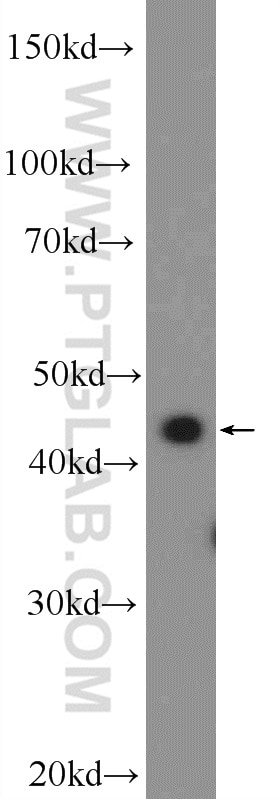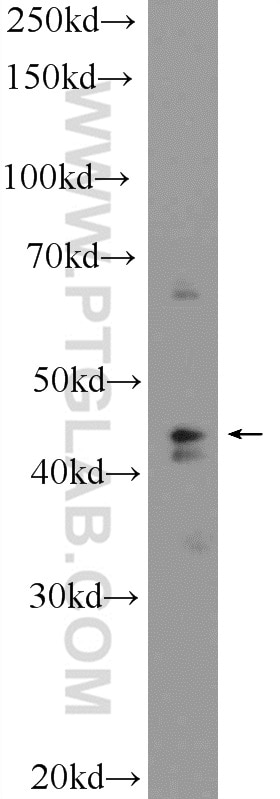Tested Applications
| Positive WB detected in | Raji cells, HL-60 cells |
Recommended dilution
| Application | Dilution |
|---|---|
| Western Blot (WB) | WB : 1:500-1:1000 |
| It is recommended that this reagent should be titrated in each testing system to obtain optimal results. | |
| Sample-dependent, Check data in validation data gallery. | |
Product Information
25845-1-AP targets SUDS3 in WB, ELISA applications and shows reactivity with human samples.
| Tested Reactivity | human |
| Host / Isotype | Rabbit / IgG |
| Class | Polyclonal |
| Type | Antibody |
| Immunogen |
CatNo: Ag22961 Product name: Recombinant human SUDS3 protein Source: e coli.-derived, PGEX-4T Tag: GST Domain: 1-184 aa of BC112000 Sequence: ELKENLIAELEEKKKMIENEKLTMELTGDSMEVKPIMTRKLRRRPNDPVPIPDKRRKPAPAQLNYLLTDEQIMEDLRTLNKLKSPKRPASPSSPEHLPATPAESPAQRFEARIEDGKLYYDKRWYHKSQAIYLESKDNQKLSCVISSVGANEIWVRKTSDSTKMRIYLGQLQRGLFVIRRRSAA Predict reactive species |
| Full Name | suppressor of defective silencing 3 homolog (S. cerevisiae) |
| Calculated Molecular Weight | 328 aa, 38 kDa |
| Observed Molecular Weight | 43 kDa |
| GenBank Accession Number | BC112000 |
| Gene Symbol | SUDS3 |
| Gene ID (NCBI) | 64426 |
| RRID | AB_2880265 |
| Conjugate | Unconjugated |
| Form | Liquid |
| Purification Method | Antigen affinity purification |
| UNIPROT ID | Q9H7L9 |
| Storage Buffer | PBS with 0.02% sodium azide and 50% glycerol, pH 7.3. |
| Storage Conditions | Store at -20°C. Stable for one year after shipment. Aliquoting is unnecessary for -20oC storage. 20ul sizes contain 0.1% BSA. |
Background Information
SUDS3 (Sin3 histone deacetylase corepressor complex component SDS3), also known as SAP45 andSDS3, is a component of the Sin3 histone deacetylase corepressor complex. In this complex SDS3 interacts with SIN3A to regulate gene expression via chromatin modification. SUDS3 represses transcription and augments histone deacetylase activity of HDAC1. It may have a potential role in tumor suppressor pathways through regulation of apoptosis.
Protocols
| Product Specific Protocols | |
|---|---|
| WB protocol for SUDS3 antibody 25845-1-AP | Download protocol |
| Standard Protocols | |
|---|---|
| Click here to view our Standard Protocols |






